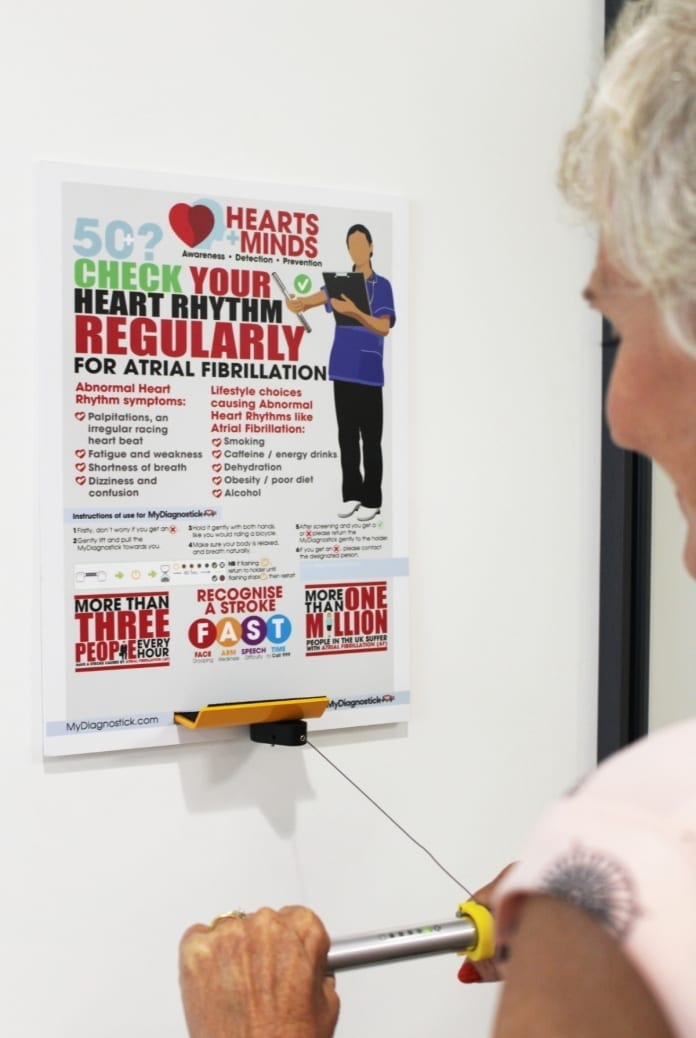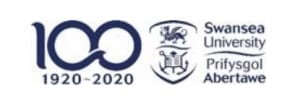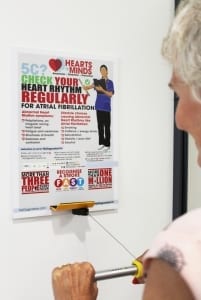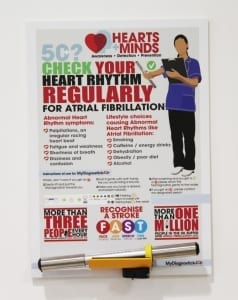New monitor now giving instant access to vital health check
A new heart rhythm monitor at Swansea University could provide vital health information for staff, students and members of the public.
The free, easy-to-use device, installed in the reception of the University’s Health and Wellbeing Academy, gives people a chance to check their heart rhythm and provides instant feedback.
Called MyDiagnostick, it detects an irregular heart rhythm, which could indicate a person has atrial fibrillation or AF.
To mark Global AF Aware Week, which runs from November 19 to 25, university staff want to let people know about the new monitor.
AF is more common in those over 50 but is by no means confined to that age group. Left untreated, AF can dramatically increase the risk of stroke so it is important that it is recognised and treated quickly.
Dr Emma Rees, senior lecturer in cardiology at the College of Human and Health Sciences, said:
“We want to raise awareness about the importance of regular pulse checks and to give advice about what a person should do if they feel palpitations, dizziness or sudden breathlessness.”
People with AF may be aware of their heart fluttering or beating irregularly and that should prompt them to seek medical advice. However, she said, sometimes AF does not cause any symptoms and a person may be completely unaware that their heart rhythm is irregular.
AF Aware Week sees healthcare professionals across the world take part in events to raise awareness of this important condition.
Dr Rees will be leading free public events to teach groups of local people how to check their pulse and to explain why it is important to make regular checks.
While these events are important in raising awareness, there is a need to spread the message to a greater number of people and to support those who lack the confidence to check their own pulse. Dr Rees hopes that the MyDiagnostick device in the university will support this work.
Carrying out a check with the device is simple and requires holding a bar for one minute when it will display either a green tick if the rhythm is regular or a red cross if an irregularity is suspected.
Dr Rees said:
“A green tick means that the rhythm is regular at that point in time but anyone with symptoms should still seek advice because irregular rhythms can stop and start.
“A red cross does not necessarily mean the person has AF but it does mean that a more formal check of the heart rhythm is needed. Free advice can be sought from our friendly healthcare scientists and arranged through the receptionist. Detailed results can be passed on to a person’s GP if necessary.
“The device has limitations because it only gives a brief snapshot of someone’s heart rhythm but it helps to raise awareness of pulse checks and AF and could provide important information for some people.”
This service is being evaluated by a Healthcare Science student as part of a dissertation project about the device’s use and effectiveness in the Health and Wellbeing Academy.
This work is helping to build on Swansea University’s established research expertise in the field of preventative cardiology. A research project led by Professor Julian Halcox demonstrated the benefits of using another mobile monitoring device to detect AF and won the prestigious Research in Excellence in the NHS category at last year’s MediWales Innovation Awards.
Dr Rees said:
“A key role of the Health and Wellbeing Academy is to help the local community to engage with, and benefit from, leading healthcare research.
“We want to help people understand how they can improve their own cardiovascular health and reduce the risk of life-changing events like heart attacks and strokes. Raising awareness of AF and the importance of heart rhythm checks contributes to this role.”
The monitor is free to use and can be found in reception of the Health and Wellbeing Academy, part of the College of Human and Health Science.
It offers a range of affordable and flexible services to support the health and wellbeing of people in South West Wales.
The services offered complement those provided by the NHS and allow people to make informed and positive lifestyle choices to improve their health and wellbeing. Its services include osteopathy, audiology, bereavement care, cardiology and pregnancy related services including, breastfeeding support, hypnobirthing, postnatal support and positive parenting.
Help keep news FREE for our readers
Supporting your local community newspaper/online news outlet is crucial now more than ever. If you believe in independent journalism, then consider making a valuable contribution by making a one-time or monthly donation. We operate in rural areas where providing unbiased news can be challenging. Read More About Supporting The West Wales Chronicle


























